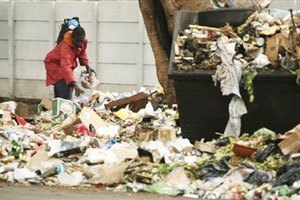
The worldwide technological revolution and globalisation has helped in increasing connectivity and trans-boundary linkages; however, this has created a new and dangerous environmental problem in the form of electronic waste (e-waste).
Environment with Musapindira Mlambo
E-waste refers to discarded electrical or electronic devices such as TVs, stoves, cartridges, refrigerators, printers, cellphones, computers, microwaves and other electrical appliances, which would have completed their life cycles and then disposed.
An environmental disaster looms when these devices are improperly handled, transported and disposed because they contain toxic heavy metals such as lead, mercury and cadmium which pollutes both the soil and underground water.
According to the recently released United Nations Environment Programme (Unep) manual on e-waste, the penetration rate for electronic devices in developing countries has grown over the years.
In efforts to bridge the digital divide there has been an increase in the importation of second hand electronic goods to Africa. Zimbabwe has also seen an upsurge in demand for cheap electronic goods from countries such as China and Japan, however, some of these devices have ended up as junk.
E-waste needs proper handling, especially at their end of life-cycle because they contain hazardous substances, which have the potential to harm both the environment and human health. For example, research has shown that an average computer may contain up to 1 000 toxins, such as mercury and heavy metals which damages the nervous system, the brain, causes cancer and birth defects. Legislative framework on e-waste should be put in place
The lack of policy and legislation on e-waste in Zimbabwe has also seen little action being done in the proper handling and recovery of such waste. The Environmental Management Act (20:27) prohibits the discharge of hazardous substances into the environment, but there is no specific legislation regulating e-waste.
- Chamisa under fire over US$120K donation
- Mavhunga puts DeMbare into Chibuku quarterfinals
- Pension funds bet on Cabora Bassa oilfields
- Councils defy govt fire tender directive
Keep Reading
There is the need to have a standalone legislative framework on e-waste for the country. This will help in ensuring the proper handling and disposal of e-waste. Environmental Management Agency (EMA) director general, Mutsa Chasi was recently quoted in the local media saying they are drafting a document or strategy for the safe handling and disposal of e-waste.
This strategy, when completed, should be properly enforced and strengthened, so that everyone will have the knowledge on how to handle e-waste and employ the cradle to cradle metabolisms.
Zimbabwe signed the Basel Convention of 1989 and the Bamako Convention of 1994, which bans the trans-boundary movement of hazardous waste, but like many developing countries such treaties have not been supported by local legislation.
According to the Unep executive director, Achim Steiner, there is a need to close the material flow by transforming waste into resources.
In Zimbabwe, there are few companies that recycle e-waste, although backyard recycling and repairing of electronic devices is very common. These initiatives of reuse and recycling should be promoted.
Organisations such as Environment Africa have been promoting the cradle to cradle concept of recycling and reuse, such efforts are commendable but there is need for a collective responsibility in tackling the problem of e-waste. Institutions of higher learning should also help in disseminating information on e-waste through research. Zimbabwe as a country should wake up to the reality that e-waste is a challenge they should start taking action on.
It is imperative to emphasise that sound e-waste management requires holistic approaches, and the global world must also assist developing countries in handling e-waste. There is the need for global best practices and standards which are then supported by regional and local standards.
It is everyone’s responsibility to ensure the proper handling and recovery of e-waste. Individuals should recycle their old electronic gadgets or even donate when not in use because one’s output can be another’s input.
A take back system into the flow chain should be introduced from production to disposal. There is the need for more Public Private Partnerships in ensuring sound e-waste management plans for the country.
Recycling of e-waste will not only improve environmental health, but job opportunities will also be created. With Zimbabwe’s high unemployment rates, the strengthening of e-waste recycling initiatives will go a long way in empowering people and uplifting their living standards.
Feedback: musapindiram@gmail.com/info@environmentafrica.org










